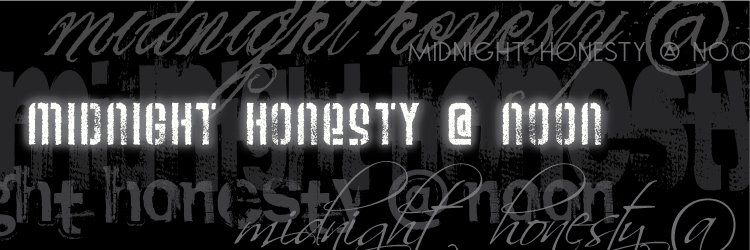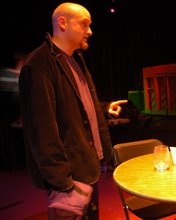Live for the Moment
Last Thursday I had the opportunity to see the Vestige Group present Jason Grote's New Jersey Book of the Dead at the Hyde Park Theatre.
It raised a question for me that I I'd like to discuss... after this brief digression.
[Please note that as a critic I tend to blame actors first, technicians second, playwrights third, and directors where applicable]
It was a Thursday night performance after three nights off. It's an odd start to a rundown of my opinion of the show... but I think it bears mention. In small theatre, when you have an intense rehearsal period followed by a short run, that time off can be a killer. The cast and technicians take a breath, but the show isn't in their bones yet, often leaving that first show back with a lost in the desert sort of feel.
I think that was in effect here.
New Jersey Book of the Dead is an intelligent ensemble piece focused on privacy and boundaries. Touching on the walls we put up between our public and private lives and the consequences of that separation being eroded, in this case by technology.
Structurally the play intersperses a linear narrative of the effects of technological surveillance (via a software solution called Omnivore) on the lives of a small group of call center temps with a mystical step out into a more mystical poetic universe where slightly evolving scenes repeat and a deranged man speaks the truth.
And honestly it's hard to say whether the text worked or not.
This is the second performance by the Vestige Group that I have seen, the first being the quiet, detailed Brilliant Traces. The difference in specificity of execution is striking. Where Brilliant Traces allowed for silence and had a deliberately varied pace, New Jersey Book of the Dead never found it's rhythm.
The actor's energy and focus at several times seemed ready to click into place, but didn't. In a play structured to flow directly from one scene into another there were numerous lighting cue hiccups that either let a scene linger too long or didn't come up quickly enough on the next area. The actors, trying to find the play, were never really sure whether to abandon the (already completed) scene they were stuck in, or to begin without the light in the next.
As an audience member I shared their disjointed lurching. This has read as entirely negative I'm sure and I don't really mean it to be. Which I guess is why I led with the Thursday night disclaimer. It never really seemed that the show was suffering from lack of talent. (Though I think a deeper minority talent base in Austin would have helped some of the relationship dynamics) Nor was it suffering from a lack of understanding of the show and what it required. I think it was just one of those nights.
And let me say this: despite the execution issues on this night the play didn't lose me, which is a point for Mr. Grote.
Which (finally) brings me to my point.
The show hinges on 9/11.
The audience was treated to projected images of the towers burning and of audio of screaming over images of people running from the dust. (It was remarkable how jarring that was after 6 years and an endless loop of similar images) This moment stopped the action and drove us to the resolution of the play. One half of the resolution finished up the protagonist's story, while the other half showed us the sales representative for Omnivore pitching her wares to Congress.
Now, as best I can tell this show was written during the lead up to the Iraq conflict and premiered in 2004.
In 2004 we knew that our President was ethically challenged, and was actively engaged in creating a revisionist present, but the terror watchlist for all, Guantanamo Bay, and warrantless wiretapping were yet to come (man, it's been long three years). Viewed in 2004 this show would have had a very different sense of menace than it does here in the waning days of 2007.
In a world in which we know and expect that the executive branch of our government is monitoring us in any way that it can New Jersey Book of the Dead isn't a warning, it's simply a signpost.
My initial reaction was that this was a missed opportunity.
But as I sat with it a while longer, I no longer think that way. Or rather, I think that the opportunity missed was by producing companies of a political bent in 2004. Mr. Grote wrote a textured play considerably more nuanced than most political theatre, the fact that it wasn't widely produced when it was prescient isn't his fault.
We often talk out here in the ether about the ephemeral nature of this art form. But it's seems in my experience that everyone is trying to create for the ages instead of this moment.
Would it be gratifying to know that 20 years from now someone felt a pull to pick up something that I had created and recreate it? Of course it would. But my audience is here now, and there's no shame in creating something that is specific to this time and place.
So let me ask you this:
Does your experience match mine? Are theatre artists striving to write/create for eternity?
If it does... why do you think it is so?
Do we serve our audiences better with product more specifically created for here and now, or with more generalized pieces?
Is this only a problem in politically themed pieces or is it more universal?
And as an aside to Mr. Grote: congratulations on the warm reception for 1001 and please excuse my chalk outlines of your themes in New Jersey Book of the Dead.







